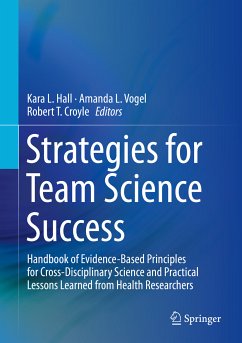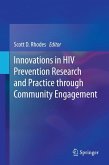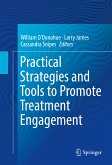Strategies for Team Science Success (eBook, PDF)
Handbook of Evidence-Based Principles for Cross-Disciplinary Science and Practical Lessons Learned from Health Researchers
Redaktion: Hall, Kara L.; Croyle, Robert T.; Vogel, Amanda L.


Alle Infos zum eBook verschenken

Strategies for Team Science Success (eBook, PDF)
Handbook of Evidence-Based Principles for Cross-Disciplinary Science and Practical Lessons Learned from Health Researchers
Redaktion: Hall, Kara L.; Croyle, Robert T.; Vogel, Amanda L.
- Format: PDF
- Merkliste
- Auf die Merkliste
- Bewerten Bewerten
- Teilen
- Produkt teilen
- Produkterinnerung
- Produkterinnerung

Hier können Sie sich einloggen

Bitte loggen Sie sich zunächst in Ihr Kundenkonto ein oder registrieren Sie sich bei bücher.de, um das eBook-Abo tolino select nutzen zu können.
Collaborations that integrate diverse perspectives are critical to addressing many of our complex scientific and societal problems. Yet those engaged in cross-disciplinary team science often face institutional barriers and collaborative challenges. Strategies for Team Science Success offers readers a comprehensive set of actionable strategies for reducing barriers and overcoming challenges and includes practical guidance for how to implement effective team science practices. More than 100 experts--including scientists, administrators, and funders from a wide range of disciplines and…mehr
- Geräte: PC
- ohne Kopierschutz
- eBook Hilfe
- Größe: 14.37MB
![Behavioral Clinical Trials for Chronic Diseases (eBook, PDF) Behavioral Clinical Trials for Chronic Diseases (eBook, PDF)]() Lynda H. PowellBehavioral Clinical Trials for Chronic Diseases (eBook, PDF)81,95 €
Lynda H. PowellBehavioral Clinical Trials for Chronic Diseases (eBook, PDF)81,95 €![Behavioral Medicine and Integrated Care (eBook, PDF) Behavioral Medicine and Integrated Care (eBook, PDF)]() Behavioral Medicine and Integrated Care (eBook, PDF)40,95 €
Behavioral Medicine and Integrated Care (eBook, PDF)40,95 €![Innovations in HIV Prevention Research and Practice through Community Engagement (eBook, PDF) Innovations in HIV Prevention Research and Practice through Community Engagement (eBook, PDF)]() Innovations in HIV Prevention Research and Practice through Community Engagement (eBook, PDF)73,95 €
Innovations in HIV Prevention Research and Practice through Community Engagement (eBook, PDF)73,95 €![Handbook of Quality of Life in Cancer (eBook, PDF) Handbook of Quality of Life in Cancer (eBook, PDF)]() Handbook of Quality of Life in Cancer (eBook, PDF)97,95 €
Handbook of Quality of Life in Cancer (eBook, PDF)97,95 €![Practical Strategies and Tools to Promote Treatment Engagement (eBook, PDF) Practical Strategies and Tools to Promote Treatment Engagement (eBook, PDF)]() Practical Strategies and Tools to Promote Treatment Engagement (eBook, PDF)40,95 €
Practical Strategies and Tools to Promote Treatment Engagement (eBook, PDF)40,95 €![Broadly Engaged Team Science in Clinical and Translational Research (eBook, PDF) Broadly Engaged Team Science in Clinical and Translational Research (eBook, PDF)]() Broadly Engaged Team Science in Clinical and Translational Research (eBook, PDF)40,95 €
Broadly Engaged Team Science in Clinical and Translational Research (eBook, PDF)40,95 €![Success Stories as Hard Data (eBook, PDF) Success Stories as Hard Data (eBook, PDF)]() Barry M. KibelSuccess Stories as Hard Data (eBook, PDF)161,95 €
Barry M. KibelSuccess Stories as Hard Data (eBook, PDF)161,95 €-
-
-
Collaborations that integrate diverse perspectives are critical to addressing many of our complex scientific and societal problems. Yet those engaged in cross-disciplinary team science often face institutional barriers and collaborative challenges. Strategies for Team Science Success offers readers a comprehensive set of actionable strategies for reducing barriers and overcoming challenges and includes practical guidance for how to implement effective team science practices. More than 100 experts--including scientists, administrators, and funders from a wide range of disciplines and professions-- explain evidence-based principles, highlight state-of the-art strategies, tools, and resources, and share first-person accounts of how they've applied them in their own successful team science initiatives. While many examples draw from cross-disciplinary team science initiatives in the health domain, the handbook is designed to be useful across all areas of science.
Strategies for Team Science Success will inspire and enable readers to embrace cross-disciplinary team science, by articulating its value for accelerating scientific progress, and by providing practical strategies for success. Scientists, administrators, funders, and others engaged in team science will also leave equipped to develop new policies and practices needed to keep pace in our rapidly changing scientific landscape. Scholars across the Science of Team Science (SciTS), management, organizational, behavioral and social sciences, public health, philosophy, and information technology, among other areas of scholarship, will find inspiration for new research directions to continue advancing cross-disciplinary team science.The chapter "Comprehensive Collaboration Plans: Practical Considerations Spanning Across Individual Collaborators to Institutional Supports" is available open access under a Creative Commons Attribution 4.0 International License via link.springer.com.
Dieser Download kann aus rechtlichen Gründen nur mit Rechnungsadresse in A, B, BG, CY, CZ, D, DK, EW, E, FIN, F, GR, HR, H, IRL, I, LT, L, LR, M, NL, PL, P, R, S, SLO, SK ausgeliefert werden.
- Produktdetails
- Verlag: Springer International Publishing
- Seitenzahl: 633
- Erscheinungstermin: 13. November 2019
- Englisch
- ISBN-13: 9783030209926
- Artikelnr.: 58253637
- Verlag: Springer International Publishing
- Seitenzahl: 633
- Erscheinungstermin: 13. November 2019
- Englisch
- ISBN-13: 9783030209926
- Artikelnr.: 58253637
- Herstellerkennzeichnung Die Herstellerinformationen sind derzeit nicht verfügbar.







